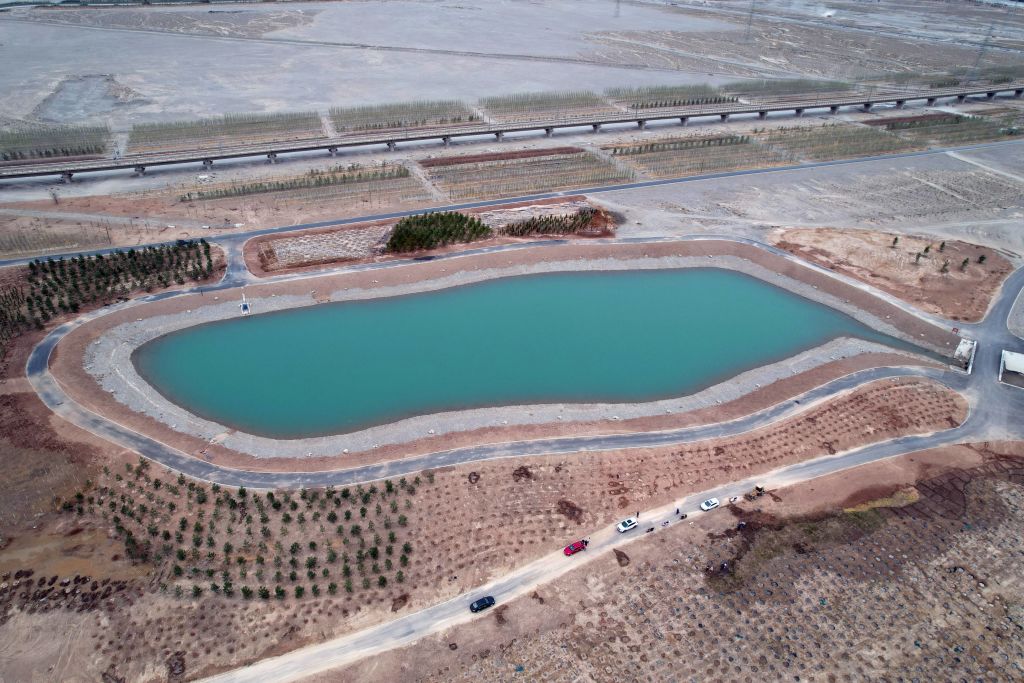
China intends to plant and conserve 70 billion trees by 2030 in its efforts to fight deforestation and climate change, the nation’s special envoy on climate Xie Zhenhua told the World Economic Forum (WEF) in Davos on Tuesday, as the world’s worst polluter ramps up attempts to rebrand itself as an environmental champion.
The pledge comes as part of the One Trillion Trees initiative, a global reforestation plan unveiled at the WEF two years ago, supported by funding from Salesforce CEO Marc Benioff and his wife Lynne, who together also own TIME.
In a speech in Davos on Tuesday, Xie said the 70 billion trees commitment was to “green our planet, combat climate change, and increase forest carbon sinks.” It builds on Chinese President Xi Jinping’s 2020 pledge to have China achieve peak carbon emission by 2030 and carbon neutrality by 2060.
There have been other significant tree-related pledges in recent years, though none approach China’s. For example, according to the One Trillion Tree Initiative’s website, the U.S. has pledged to “conserve, restore and grow more than 955 million trees…by 2030,” and, under the European Green Deal, the E.U. has committed to “planting at least 3 billion additional trees” in that same time frame.
Environmentalists have raised concerns that reforestation may be used as a fig leaf to obfuscate rising emissions. “Promoting nature at large scales can be fantastic if done in an ecologically responsible way, but it should not distract from efforts to decarbonize,” says Tom Crowther, an environmental scientist at ETH Zurich. They also point out that China has engaged in vast reforestation work in the past of varying success. In 1978, it launched a “Great Green Wall” to combat the encroachment of the Gobi Desert, with 2,800 mi of forest strips planned by 2050. Thousands of acres of shifting dunes have been stabilized while the frequency of the sandstorms that regularly plague Beijing especially fell by one-fifth nationwide between 2009 and 2014.
But problems such as land erosion and over-farming stalled efforts in many areas of the Great Green Wall, while chronic water pollution rendered some soil unsuitable to sustain life. There are also concerns over biodiversity since most reforestation efforts have centered on a specific plant species, making the resulting forests unappealing for bird life and susceptible to blights. In 2000, 1 billion poplar trees in the western province of Ningxia were lost to a single disease, setting back two decades of planting efforts.
“Any tree planting should also take biodiversity into consideration,” Li Shuo, senior climate and energy policy officer for Greenpeace East Asia, tells TIME. “We all know how monoculture is bad for our planet. A robbing Peter (biodiversity) to pay Paul (climate) dynamic should be avoided.”
China has improved its reforestation work in recent years, aided by international expertise and private funding. At the same time, hard figures are difficult to ascertain. Over the past decade, China claims to have regrown more than 70 million hectares of forest cover. However, a 2021 United Nations report report says China’s forest cover increased from 157 million hectares in 1990 to 220 million hectares in 2020. China’s 14th “Five Year Plan,” formally adopted in March 2021, has a stated target of increasing forest coverage to 24.1% by 2025, and forest stock volume up to 19 billion cubic meters.
That said, it’s unclear how much of the 70 billion commitment will be new trees. The exact wording of Xie’s pledge concerns “actions to plant, conserve, restore and manage,” which opens the possibility that existing forests may be included without additional action. Indeed, corporations and governments around the world, including in the U.S., often count already-protected existing forests as part of their carbon-sink footprints.
Certainly, China is ramping up efforts to engage positively on climate as it faces increased international censure on myriad other issues, including its persecution of Uighur Muslims and other minorities, and most recently its support for Russia’s invasion of Ukraine.
Contrary to strict COVID-19 travel protocols for Chinese officials, Xie is embarking on a whistle-stop European tour. Following Davos, he meets U.S. climate envoy John Kerry and German leaders on the sidelines of the G7 climate ministerial summit in Berlin on Wednesday, followed by more meetings with senior climate officials from around the globe in Stockholm.
It’s a “sign that China is still interested in playing the climate card to improve [and] stabilize its relationships with other powers,” says Li.
More Must-Reads from TIME
- Cybersecurity Experts Are Sounding the Alarm on DOGE
- Meet the 2025 Women of the Year
- The Harsh Truth About Disability Inclusion
- Why Do More Young Adults Have Cancer?
- Colman Domingo Leads With Radical Love
- How to Get Better at Doing Things Alone
- Michelle Zauner Stares Down the Darkness
Write to Charlie Campbell at charlie.campbell@time.com